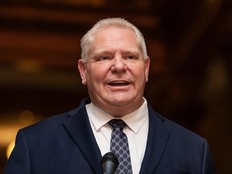Jake Fuss
LATEST STORIES BY JAKE FUSS
OPINION: Shakedown attempt by Canada Post underscores need for privatization
For the second time in just six months, the Canadian Union of Postal Workers (CUPW) is threatening strike action. As Canadians know all too well, postal strikes can be highly disruptive, given that the federal government provides Canada Post with a near-monopoly on letter mail across the country. CUPW is well aware of this and uses that to its advantage in negotiations. While CUPW has the right to ask for whatever it wants, Canadians should finally be freed from this albatross. In January, the Trudeau government loaned Canada Post a whopping $1.034 billion to help “maintain its solvency and continue operating.” Since 2018, Canada Post has lost more than $4.6 billion and according to its latest financial update, it lost more than $100 million in the first quarter of 2025 alone. Canadians are on the hook for these losses because the federal government owns Canada Post. Salaries and other employee costs comprise more than 6% of Canada Post’s expenses and CUPW and Canada Post management both know they can simply pass any losses on to Canadians. Consequently, there’s less incentive for management to control the bottom line or make reasonable budget requests when negotiating with the government. But, if the government privatizes Canada Post, it will impose a proper constraint on costs that doesn’t currently exist. This is only fair given there’s no compelling reason why Canadians should underwrite the inflation of salaries in a money-losing Crown corporation. Of course, government ownership of Canada Post is archaic. When the organization was founded more than 250 years ago, the world was quite different. In today’s age of Amazon, a plethora of delivery services exist coast-to-coast that serve Canadian consumers. Other countries, including the Netherlands, Austria and Germany, long ago privatized their postal services. The result was increased competition, which in turn reduced prices and improved quality. Alongside privatization, the federal government should also eliminate Canada Post’s near-monopoly status on letter mail. This policy is purportedly meant to ensure universal service. But, in reality, it prohibits other potential service providers from entering the letter-delivery market (including in remote areas that may experience less Canada Post service post-privatization), deprives Canadians of choice and, crucially, reduces the incentive for Canada Post to improve its service. Simply put, the federal government should focus on its core responsibilities and delivering mail is clearly not one of them. Given Canada Post’s latest attempted shakedown of Canadians, it’s never been clearer that it’s time for Canada Post to go the way of Air Canada, de Havilland and CN Rail. Once upon a time, the federal government owned all three of these entities, until it became clear there was no reason for the government to own an airline, build planes or deliver goods by train. Why is letter mail any different? Canadians deserve better. Alex Whalen and Jake Fuss are research directors at the Fraser Institute

OPINION: Ford government failed to keep fiscal powder dry — now Ontarians will pay the price
The Ford government last week released its 2025 budget — it’s first since getting re-elected for a third term — and once again failed to balance the books, resulting in more borrowing and more debt on the backs of Ontarians.

OPINION: Five key issues — besides Trump tariffs — the Carney government should tackle
On Tuesday in Ottawa, Prime Minister Mark Carney unveiled his new cabinet, consisting of 28 ministers and 10 secretaries of state. They have their work cut out for them. In addition to President Donald Trump’s trade war, the Carney government must tackle several other critical issues that have persisted long before Trump was re-elected.

FUSS: CBC ‘fact-checker’ gets his facts wrong
At all times, during an election period and beyond, the media must report accurate information and, when necessary, correct the record. For example, following the English-language federal leaders’ debate on April 17, CBC reporter Jonathon Gatehouse appeared on CBC News and “fact-checked” a statement by Conservative Leader Pierre Poilievre, who had referenced a study published by the Fraser Institute. Unfortunately, during the segment , Gatehouse got his facts wrong.

OPINION: Provinces and the next federal government should end corporate welfare
General Motors recently announced the temporary closure of its electric vehicle (EV) manufacturing plant in Ontario, laying off 500 people because its new EV isn’t selling. The plant will shut down for six months despite hundreds of millions in government subsides financed by taxpayers. This is just one more example of corporate welfare—when governments subsidize favoured industries and companies—and it’s time for the provinces and the next federal government to eliminate it.

OPINION: Next government must work to strengthen national defence
Due to U.S. President Donald Trump’s trade war, Canada-U.S. relations are the central issue in the federal election. But a related issue — Canada’s national defence strategy — hasn’t received much attention. But it should.




